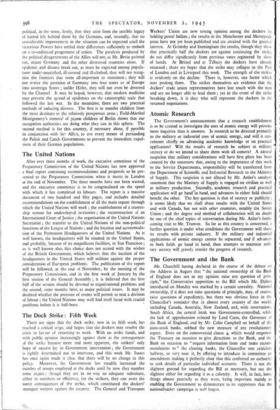The Government and l he Bank
Mr. Churchill having declared in the course of the debate on the Address in August that " the national ownership of the Bank of England does not in my opinion raise any question of prin- ciple," the Conservative was to the Bill which Mr. Dalton introduced on Monday was marked by a certain unreality. National ownership, if it does not raise questions of principle, may, of course, raise questions of expediency, but there was obvious force in the Chancellor's reminder that in almost every country of the world, including Canada, Australia, New Zealand, and, with reservations, South Africa, the central bank was Government-controlled, while the lack of apprehension evinced by Lord Cairo, the Governor of the Bank of England, and by Mr. Colin Campbell on behalf of the joint-stock banks, robbed the new measure of any revolutionary aspect. Even on the controversial clause 4, which would empower the Treasury on occasion to give directions to the Bank, and the Bank on occasion to "request information from and make recom- mendations to " the clearing banks, the Chancellor met criticism halfway, or very near it, by offering to introduce in committee an amendment making it perfectly dear that this conferred no authority to seek details of particular individual accounts. There is not the slightest ground for regarding the Bill as necessary, but not the slightest either for regarding it as a calamity. It will, in fact, leave things almost precisely as they were, being important mainly as enabling the Government to demonstrate to its supporters that the nationalisation campaign is well begun.






























 Previous page
Previous page